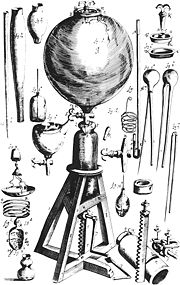
Pneumatic chemistry
Encyclopedia

Investigations involving pneumatic chemistry are considered significant both for the improvements in laboratory techniques that they involved and the new information obtained about gases, including the Earth's atmosphere. However, an equal if not greater significance is the role pneumatic chemistry played in Dalton's atomic theory and, later still, in helping to understand and measure atomic and molecular masses.
Jan Baptist van Helmont
Jan Baptist van Helmont
Jan Baptist van Helmont was an early modern period Flemish chemist, physiologist, and physician. He worked during the years just after Paracelsus and iatrochemistry, and is sometimes considered to be "the founder of pneumatic chemistry"...
(1579 – 1644) is sometimes considered the founder of pneumatic chemistry, coining the word "gas" and conducting experiments involving gases. Pneumatic chemists credited with discovering chemical elements include Joseph Priestley
Joseph Priestley
Joseph Priestley, FRS was an 18th-century English theologian, Dissenting clergyman, natural philosopher, chemist, educator, and political theorist who published over 150 works...
, Henry Cavendish
Henry Cavendish
Henry Cavendish FRS was a British scientist noted for his discovery of hydrogen or what he called "inflammable air". He described the density of inflammable air, which formed water on combustion, in a 1766 paper "On Factitious Airs". Antoine Lavoisier later reproduced Cavendish's experiment and...
, Joseph Black
Joseph Black
Joseph Black FRSE FRCPE FPSG was a Scottish physician and chemist, known for his discoveries of latent heat, specific heat, and carbon dioxide. He was professor of Medicine at University of Glasgow . James Watt, who was appointed as philosophical instrument maker at the same university...
, Daniel Rutherford
Daniel Rutherford
Daniel Rutherford was a Scottish physician, chemist and botanist who is most famous for the isolation of nitrogen in 1772.Rutherford was the uncle of the novelist Sir Walter Scott.-Early life:...
, and Carl Scheele. Other individuals who investigated gases during this period include Robert Boyle
Robert Boyle
Robert Boyle FRS was a 17th century natural philosopher, chemist, physicist, and inventor, also noted for his writings in theology. He has been variously described as English, Irish, or Anglo-Irish, his father having come to Ireland from England during the time of the English plantations of...
, Stephen Hales
Stephen Hales
Stephen Hales, FRS was an English physiologist, chemist and inventor.Hales studied the role of air and water in the maintenance of both plant and animal life. He gave accurate accounts of the movements of water in plants, and demonstrated that plants absorb air...
, Antoine Lavoisier
Antoine Lavoisier
Antoine-Laurent de Lavoisier , the "father of modern chemistry", was a French nobleman prominent in the histories of chemistry and biology...
, and John Dalton
John Dalton
John Dalton FRS was an English chemist, meteorologist and physicist. He is best known for his pioneering work in the development of modern atomic theory, and his research into colour blindness .-Early life:John Dalton was born into a Quaker family at Eaglesfield, near Cockermouth, Cumberland,...
.

